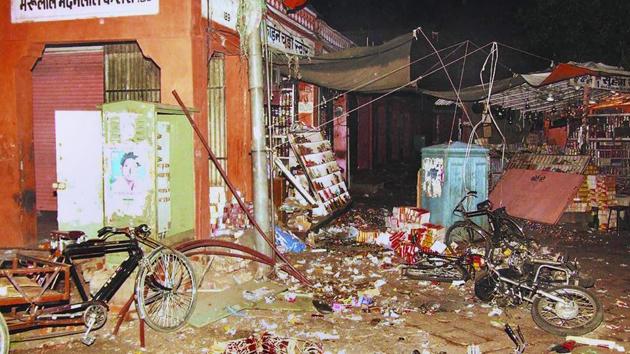4 convicted for Jaipur’s night of horror when 9 bombs went off in 20 mins
Four accused, lawyer Suresh Vyas told reporters after the judge pronounced the verdict, were convicted for the conspiracy and were considered to have planted the explosives.
A Jaipur court on Wednesday convicted four people for the worst terror attack in Jaipur — nine bombs that ripped through the Walled City on May 13, 2008, killing 71.

The sentencing hearing will be on Thursday, prosecution counsel Shrichand, who uses only one name, said.
The Jaipur court acquitted one of the accused, Shahbaz Hussain alias Shahbaz Ahmed alias Shanu, who sent an email on behalf of the Indian Mujahideen, which claimed responsibility for the terror attack. He was the first one to be arrested, four months after the blast, and investigators claimed that he was an operative of the banned Student Islamic Movement of India or SIMI.
Shrichand said four others, Mohammad Saif, 32, Mohammad Sarvar, 36, Saif-Ur-Rahman alias Saif-ur-Rahman, 36, and Salman, 34, were found guilty of murder, attempt to murder, voluntarily causing hurt by dangerous weapons or means, conspiracy, and also under relevant sections of the Explosive Substances Act and Unlawful Activities (Prevention) Act.
Watch| Jaipur bomb blast: 4 convicted by court in 2008 case which killed 71 people
Shrichand said that Shahbaz Hussain was acquitted because the court gave him the benefit of doubt. “We will file an appeal in the upper court against the acquittal. We are waiting for the punishment which will be pronounced in a day or so.”
Suresh Vyas, advocate for Shahbaz Hussain, said that there was no evidence to prove his client’s involvement.
Packer Farrukh, who represented the four others, said he respects the judgment but added that the police found no evidence linking his clients to the attack. “Around 1,300 eyewitnesses were presented before the court. None of them saw Mohammad Saif, Mohammad Sarvar, Saif-Ur-Rahman and Salman planting bombs. The police were not able to prove that they (my clients) met in Delhi and conspired to carry out the attack. They (the police) had no evidence of (my clients) doing a recce on May 11. They said that they the accused took a bus from Bikaner House but they did not present CCTV footage or the tickets.”
He added that he would appeal the judgment in the high court.
Jaipur police and the state’s anti-terror squad threw a tight ring of security around the special court where the verdict was pronounced. The five accused were brought to the court around 11.30am in a van surrounded by ATS commandos. DCP Jaipur West Kavendra Sagar said around 150 police personnel, 13 members of the emergency response team (ERT) of the ATS, three additional superintendents of police, three assistant commissioners of police and six station house officers were present at the court during the judgment.
Jaipur police charged 13 people with the terror attack in four charge sheets, the last filed in 2011. The charges were filed under section 302 (murder), 307 (attempt to murder), 326 (voluntarily causing grievous hurt by dangerous weapons or means), 427 (committing mischief and thereby causing damage), 120-B (criminal conspiracy) of the Indian Penal Code, and under relevant sections of the Explosive Substances Act 1908, Unlawful Activities (Prevention) Act and Prevention of Damage to Public Property Act.
The eight locations targeted in the nine blasts, Manak Chowk police station, Badi Chaupad, Kotwali police station, Tripoliya Bazar, Chandpole Hanuman temple, National Handloom in Jauhari Bazar, Chhoti Chaupad and Sanganeri Gate Hanuman temple, were within a 2km radius.
Nine ammonium nitrate bombs strapped to bicycles went off within the span of 25 minutes -- between 7.20pm and 7.45pm -- in the crowded areas. The bombs, wired to timing devices, were packed with metal splinters and ball bearings to maximise damage.
The trial in the eight cases – one for each of the eight locations – began in December 2008.






